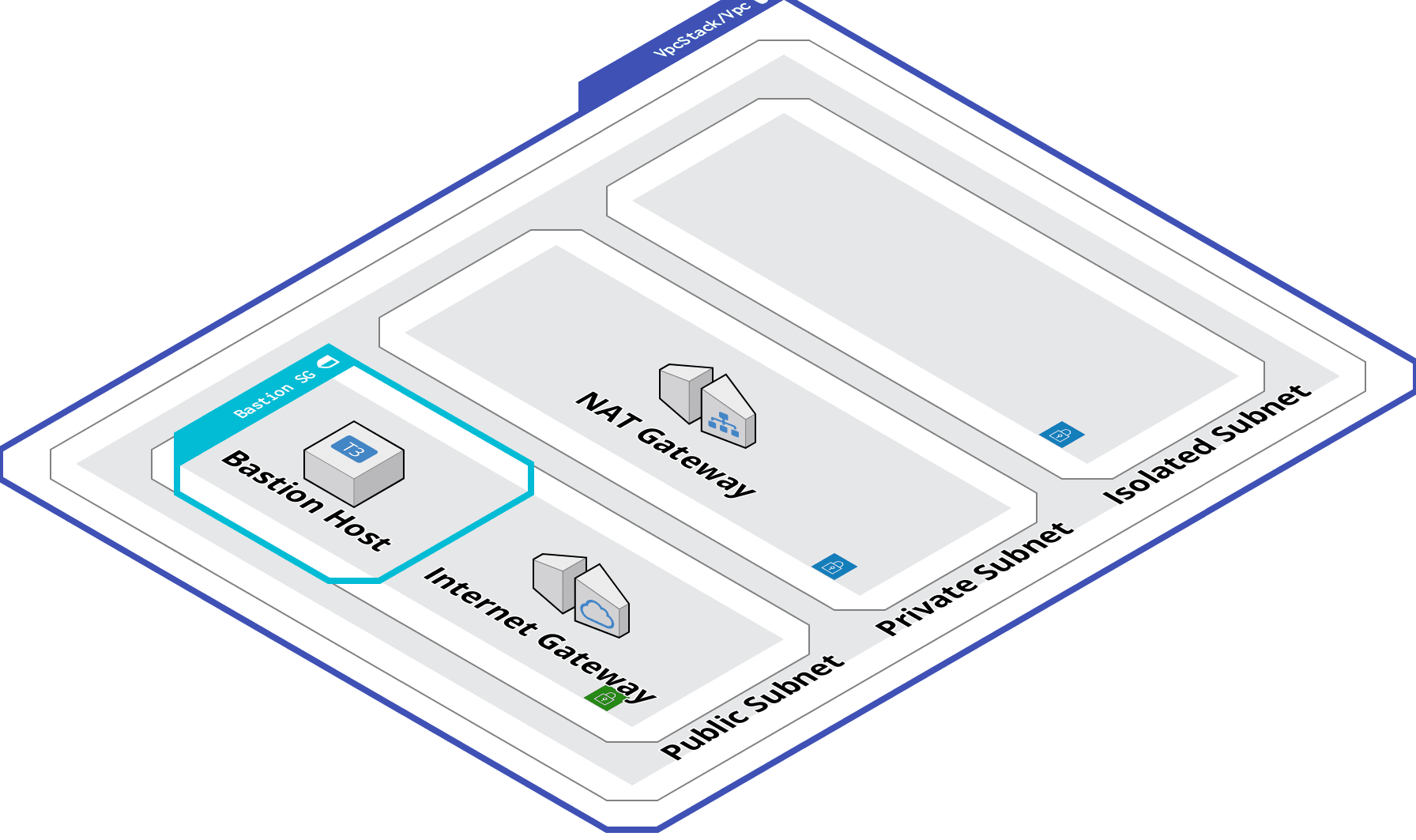Use this CDK stack to create a bastion host instance.
Bastion hosts enables you to securely connect to your Linux instances without exposing your environment to the Internet. After you set up your bastion hosts, you can access the other instances in your VPC through Secure Shell (SSH) connections on Linux.
- Deploy a bastion host instance in public subnet.
You will need the following before utilize this CDK stack:
- AWS CLI
- AWS Account and User
- Node.js
- IDE for your programming language
- AWS CDK Tookit
- AWS Toolkit VSCode Extension
Define project-name, env and profile context variables in cdk.json
{
"context": {
"project-name": "container",
"env": "dev",
"profile": "devopsrepo"
}
}Setup standard VPC with public, private, and isolated subnets.
const vpc = new ec2.Vpc(this, 'Vpc', {
maxAzs: 3,
natGateways: 1,
cidr: '10.0.0.0/16',
subnetConfiguration: [
{
cidrMask: 24,
name: 'ingress',
subnetType: ec2.SubnetType.PUBLIC,
},
{
cidrMask: 24,
name: 'application',
subnetType: ec2.SubnetType.PRIVATE,
},
{
cidrMask: 28,
name: 'rds',
subnetType: ec2.SubnetType.ISOLATED,
}
]
});- maxAzs - Define 3 AZs to use in this region.
- natGateways - Create only 1 NAT Gateways/Instances.
- cidr - Use '10.0.0.0/16' CIDR range for the VPC.
- subnetConfiguration - Build the public, private, and isolated subnet for each AZ.
Create flowlog and log the vpc traffic into cloudwatch
vpc.addFlowLog('FlowLog');Get vpc create from vpc stack
const { vpc } = props;Create security group for bastion host
const bastionSecurityGroup = new ec2.SecurityGroup(this, 'BastionSecurityGroup', {
vpc: vpc,
allowAllOutbound: true,
description: 'Security group for bastion host',
securityGroupName: 'BastionSecurityGroup'
});- vpc - Use vpc created from vpc stack.
- allowAllOutbound - Allow outbound rules for access internet
- description - Description for security group
- securityGroupName - Define the security group name
Allow ssh access to bastion host
bastionSecurityGroup.addIngressRule(ec2.Peer.anyIpv4(), ec2.Port.tcp(22), 'SSH access');Get the vpc and bastionSecurityGroup from vpc and security stacks.
const { vpc, bastionSecurityGroup } = props;Get profile from context variables
const profile = this.node.tryGetContext('profile');Create bastion host instance in public subnet
const bastionHostLinux = new ec2.BastionHostLinux(this, 'BastionHostLinux', {
vpc: vpc,
securityGroup: bastionSecurityGroup,
subnetSelection: {
subnetType: ec2.SubnetType.PUBLIC
}
});- vpc - Use vpc created from vpc stack.
- securityGroup - Use security group created from security stack.
- subnetSelection - Create the instance in public subnet.
Display commands for connect bastion host using ec2 instance connect
const createSshKeyCommand = 'ssh-keygen -t rsa -f my_rsa_key';
const pushSshKeyCommand = `aws ec2-instance-connect send-ssh-public-key --region ${cdk.Aws.REGION} --instance-id ${bastionHostLinux.instanceId} --availability-zone ${bastionHostLinux.instanceAvailabilityZone} --instance-os-user ec2-user --ssh-public-key file://my_rsa_key.pub ${profile ? `--profile ${profile}` : ''}`;
const sshCommand = `ssh -o "IdentitiesOnly=yes" -i my_rsa_key ec2-user@${bastionHostLinux.instancePublicDnsName}`;
new cdk.CfnOutput(this, 'CreateSshKeyCommand', { value: createSshKeyCommand });
new cdk.CfnOutput(this, 'PushSshKeyCommand', { value: pushSshKeyCommand });
new cdk.CfnOutput(this, 'SshCommand', { value: sshCommand});Deploy all the stacks to your aws account.
cdk deploy '*'
or
cdk deploy '*' --profile your_profile_nameAct as the jumpbox to access your private cloud resources via ec2 instance connect.
Follow the step below to access your bastion host via ec2 instance connect:
-
Generate ssh key pair in your local machine
ssh-keygen -t rsa -f my_rsa_key
-
Push the ssh public key to your bastion host instance
aws ec2-instance-connect send-ssh-public-key \ --region <region_name> --instance-id <instance_id> --availability-zone <availability_zone> --instance-os-user ec2-user --ssh-public-key file://my_rsa_key.pub
-
Access your bastion host via ssh
ssh -o "IdentitiesOnly=yes" -i my_rsa_key ec2-user@<public_dns_name_for_your_bastion_host>
npm run buildcompile typescript to jsnpm run watchwatch for changes and compilenpm run testperform the jest unit tests
cdk list (ls)Lists the stacks in the appcdk synthesize (synth)Synthesizes and prints the CloudFormation template for the specified stack(s)cdk bootstrapDeploys the CDK Toolkit stack, required to deploy stacks containing assetscdk deployDeploys the specified stack(s)cdk deploy '*'Deploys all stacks at oncecdk destroyDestroys the specified stack(s)cdk destroy '*'Destroys all stacks at oncecdk diffCompares the specified stack with the deployed stack or a local CloudFormation templatecdk metadataDisplays metadata about the specified stackcdk initCreates a new CDK project in the current directory from a specified templatecdk contextManages cached context valuescdk docs (doc)Opens the CDK API reference in your browsercdk doctorChecks your CDK project for potential problems
As this cdk stack will create bastion host instance using T3.nano, please refer the following link for pricing
